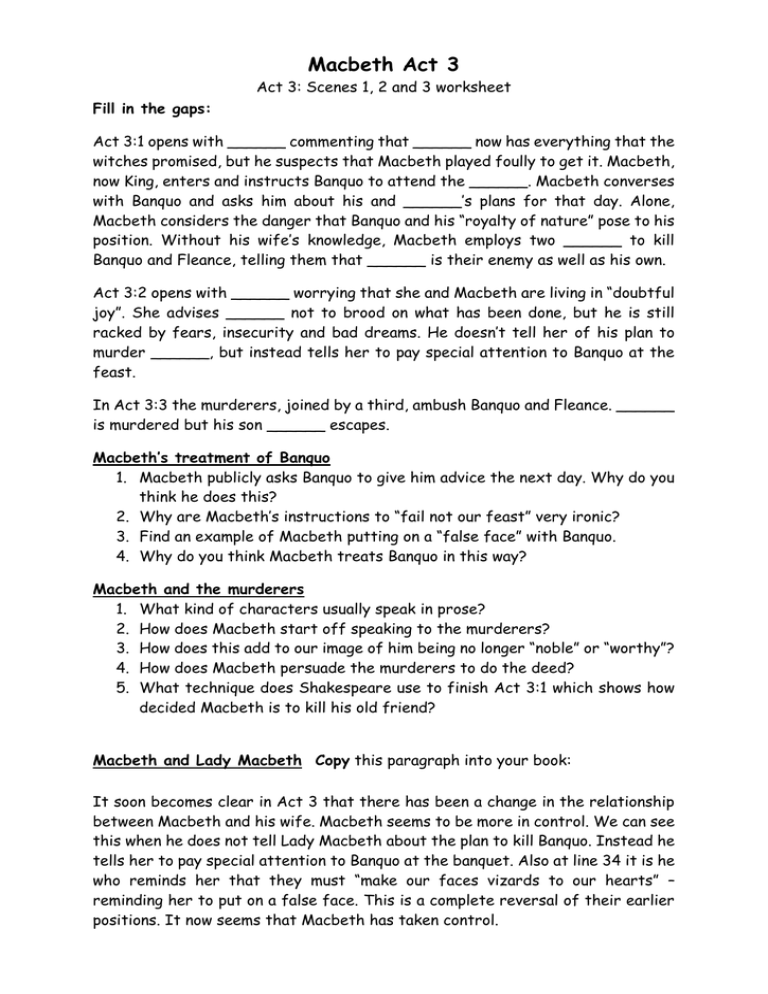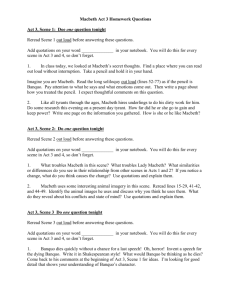Have you ever felt the chilling shiver of ambition’s dark grip? Have you ever wondered what lengths a person would go to for power? In Shakespeare’s Macbeth, we witness the tragic downfall of a valiant warrior consumed by his desire for the throne. Act 1 sets the stage for this gripping tale, introducing us to the witches, the whispers of fate, and the seeds of ambition that will blossom into chaos.

Image: studylib.net
Navigating the complexities of Shakespeare’s language can feel daunting, even for seasoned readers. That’s where a well-crafted “Macbeth Act 1 Questions and Answers PDF” becomes your trusty companion. These resources provide invaluable support as you delve into the play’s thematic richness and unravel the intricate web of characters and their motivations.
Delving into the Dark Heart of Act 1: Key Questions and Answers
Let’s unlock the secrets hidden within the opening act of Macbeth. Here’s a detailed exploration of key questions and answers that will guide you through this pivotal stage of the play.
1. The Witches and the Seeds of Fate
- Question: Why are the witches so significant in Act 1? What is their role in the play?
- Answer: The three witches are enigmatic figures who introduce the themes of fate, prophecy, and the supernatural. Their cryptic pronouncements about Macbeth’s future, predicting he will become Thane of Cawdor and then King, ignite the ambition that will ultimately consume him. The witches act as catalysts, setting the wheels of prophecy in motion and foreshadowing the tragedy to come.
2. Macbeth’s Initial Response to the Witches’ Prophecy
- Question: How does Macbeth initially react to the witches’ predictions? What clues does his reaction provide about his character?
- Answer: Macbeth is initially both excited and apprehensive. While he recognizes the allure of power and the prophecy’s implications, he also hesitates, considering the potential consequences. This reveals his conflicted nature, his ambition tempered by a sense of morality.
3. The Thane of Cawdor’s Fate
- Question: Why is it significant that Macbeth is named Thane of Cawdor? How does this event impact his ambitions?
- Answer: The prophecy’s first part, concerning the Thane of Cawdor, becomes reality almost instantaneously. This seemingly miraculous fulfillment strengthens Macbeth’s faith in the witches’ pronouncements, making the prospect of becoming king seem increasingly plausible. The prophecy fuels his ambition and erodes his sense of doubt.
4. Macbeth’s Letter to Lady Macbeth
- Question: What does Macbeth reveal in his letter to his wife? How does his letter reveal his inner turmoil?
- Answer: In his letter, Macbeth details the witches’ prophecy and his own conflicted feelings. He expresses fear about the consequences of pursuing power, suggesting that he is not fully committed to the ambitious path. However, his letter also reveals a simmering ambition and desire for the crown.
5. Lady Macbeth’s Role
- Question: How does Lady Macbeth react to the prophecy of her husband becoming king? What is her role in influencing her husband’s actions?
- Answer: Lady Macbeth is far more assertive and ambitious than her husband. She immediately embraces the possibility of Macbeth becoming king, urging him to seize this opportunity. She is ambitious and ruthless. She sees her husband’s hesitation as a weakness, shaming him for his indecisiveness and urging him to rid himself of any moral qualms. She motivates him to act, setting into motion the chain of events that leads to their downfall.
6. The Murder of Duncan
- Question: How does Macbeth come to decide to kill King Duncan? What factors influence his decision?
- Answer: Macbeth’s decision to murder Duncan is a complex one. He is initially hesitant, torn between ambition and morality. Lady Macbeth’s strong influence, his own desire for power, and the witches’ prophecy ultimately lead him to commit the act. He convinces himself that the witches’ prophecy has ordained him to be king and that this murder is a necessary evil.
7. Macbeth’s Guilt and the Consequences of His Actions
- Question: How does Macbeth feel after killing Duncan? What are the immediate consequences of his actions?
- Answer: Macbeth is consumed by guilt and paranoia after Duncan’s murder. He descends into a state of mental anguish, haunted by the events and the blood he has shed. He becomes suspicious of everyone, fearing that his crime will be discovered. The murder sets in motion a chain of events that will lead to more violence and eventually to Macbeth’s own downfall.
8. The Significance of the Play’s Setting
- Question: How do the castle and the natural world contribute to the atmosphere and themes of Act 1?
- Answer: The setting of the play plays a crucial role. Shakespeare uses the natural world, specifically the stormy weather and the unsettling atmosphere of the castle, to create a sense of unease and foreshadow the impending chaos. The play’s setting acts as a reflection of the characters’ inner turmoil, mirroring the darkness and uncertainty that consume Macbeth.
9. The Role of the Supernatural
-
Question: How does the supernatural element contribute to the tragedy of the play?
-
Answer: The witches and their pronouncements create an atmosphere of mystery and uncertainty. They are a powerful force that manipulates Macbeth’s destiny while blurring the lines between fate and free will. The supernatural forces in the play highlight the theme of the corrupting influence of power and ambition.
10. The Nature of Ambition
- Question: What insights do the first scenes of Macbeth provide about the nature of ambition?
- Answer: Act 1 presents a stark portrait of unchecked ambition that leads to self-destruction. Macbeth’s desire for the crown blinds him to the moral consequences of his actions, driving him to commit terrible deeds and ultimately leading to his ruin.
Unlocking Macbeth’s Secrets: Expert Insights
Shakespeare scholars and theater professionals offer valuable perspectives on understanding and appreciating Macbeth:
- Dr. Sarah Greene, Professor of English Literature at Oxford University: “The witches’ prophecies in Macbeth are not deterministic, but rather offer a tempting glimpse of a potential future. It’s Macbeth’s agency, his choice to embrace their words, that sets the tragic events in motion.”
- David Tennant, Actor: “Macbeth is a play about the struggle between ambition and fear. He wants to be king but knows the cost of achieving his desires. It’s a constant battle within him that drives the play forward.”

Image: studylib.net
Macbeth Act 1 Questions And Answers Pdf
https://youtube.com/watch?v=oVs1PNl7IVU
How to Leverage Your Knowledge of Act 1
- Engage with the Text: Reread Act 1 of Macbeth, focusing on the key questions and answers. Pay attention to the language, the characters’ motivations, and the themes presented.
- Explore Further Resources: Seek out scholarly articles, critical essays, and video adaptations of Macbeth to gain deeper insights.
- Share Your Reflections: Discuss the play with friends, classmates, or online communities. Share your interpretations and engage with other perspectives on the story.
Conclusion
Act 1 of Macbeth lays the foundation for a story of ambition, fate, and moral corruption. By understanding the key questions and answers, you can delve deeper into the play’s intricacies and appreciate its enduring relevance. So, go forth, explore the rich tapestry of Macbeth, and uncover the secrets hidden within its depths.






